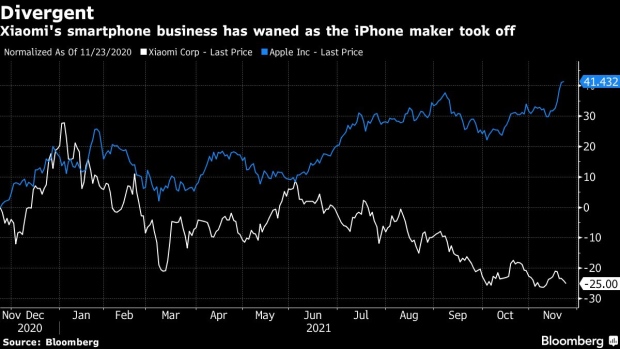Nov 23, 2021
Xiaomi’s Growth Sputters After Supply Shocks, Competition Weigh
, Bloomberg News

(Bloomberg) -- Xiaomi Corp.’s quarterly sales growth slowed sharply after component shortages and growing competition in China dealt a heavy blow to the smartphone maker.
The Beijing-based company said Tuesday revenue climbed just 8% to 78 billion yuan ($12.2 billion) in the September quarter, in line with analysts’ projections. Net income plummeted 84% to 788.6 million yuan after the company took a 3.5 billion yuan hit from losses in market investments.
Shares of Xiaomi retreated 1% in Hong Kong on Tuesday before the results. The stock has lost more than a third of its value this year as supply chain issues and a resurgence of the Covid pandemic in key markets hinder operations.
Xiaomi had briefly surpassed Apple Inc. to become the world’s No. 2 smartphone vendor before global shipments slumped in the third quarter, primarily due to component shortages. The Chinese vendor registered a 4.6% decline in smartphone shipments after high double-digit growth over the previous four quarters as supply issues started to bite, according to research firm International Data Corp. That compared to a 21% surge in shipments from Apple following the release of new iPhones.
“The supply chain and component shortage issues have finally caught up to the smartphone market, which until now seemed almost immune to this issue despite its adverse impact on many other adjacent industries,” IDC analyst Nabila Popal wrote in a report.
Xiaomi is also facing growing pressure in China. Honor, a former sub-brand of sanction-hit Huawei Technologies Co., resumed business with American suppliers from Qualcomm Inc. to Google parent Alphabet Inc. after its spinoff a year ago. The Shenzhen-based firm targets a similar customer group to Xiaomi and has been expanding its brick-and-mortar store network in China in recent months.
Xiaomi is expanding its own offline channels, with plans to open 20,000 more shops on its home turf in three years to counter competition, local media reported this month.
“Competition from Honor, rising component prices and weakening economies globally could be downside risks,” Citigroup analysts Andre Lin and Arthur Lai wrote in a note ahead of the earnings release. But Xiaomi is still expected to outgrow the market and ship 220 million smartphones in 2022, driven by a recovery in emerging countries, market expansion and channel initiatives, they said.
A stable smartphone business is key for Xiaomi’s billionaire co-founder Lei Jun to execute on his electric vehicle ambition. Xiaomi plans to mass produce its first EV in the first half of 2024 and its first plant will be in Beijing, Lei said at an investor event in October. The company is also vigorously hiring talent from the auto industry to beef up its development capabilities.
“Investors may also start pricing in Xiaomi’s EV business value, which we estimate at a theoretical HK$3 to HK$5 per share, based on the assumption that Xiaomi delivers 60,000-90,000 EVs in 2025,” China Renaissance Securities said in a research note.
Xiaomi has pledged to invest $10 billion in the EV business over the next decade, joining a market that’s already crowded with players from Tesla Inc. to local brands such as Nio and XPeng.
“Given its capital, technological and human resource strengths, we are upbeat on the outlook of Xiaomi’s smart EV business and expect the business to offer a new growth driver,” China International Capital Corp. analyst Hu Peng wrote in a research note.
©2021 Bloomberg L.P.





